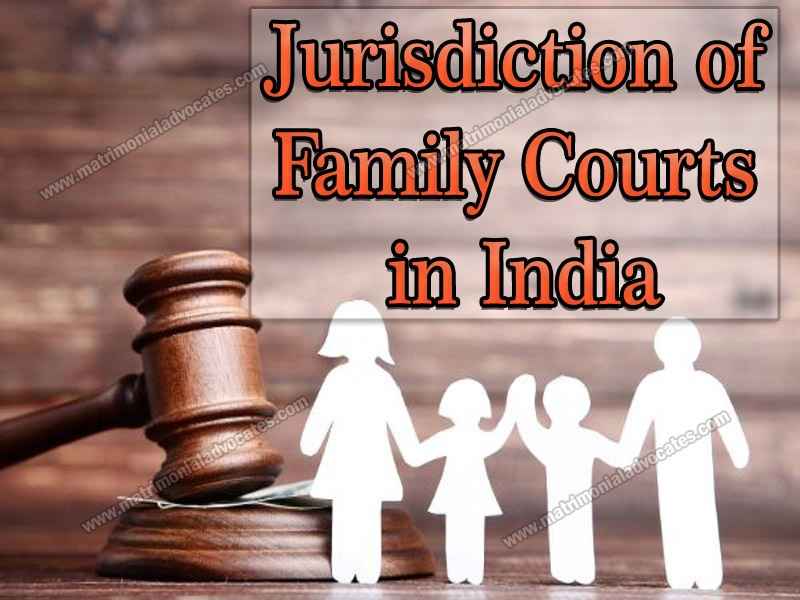
The main objective of the family courts is to settle matrimonial disputes speedily by adopting simplified procedure. It is very important to understand its jurisdiction .This article discusses the Jurisdiction of family Courts in India.
Section 7 (1) & (2) explanation of the Family Courts Act of 1984 describes the kind of disputes over which the family court has jurisdiction. It is “Subject to the other provisions of this Act, a family court shall:
1. (a) have and exercise all the jurisdiction excercisable by any district court or any subordinate civil court under any law for the time being in force in respect of suits and proceedings of the nature referred to in the explanation; and
2. be deemed, for the purpose of exercising such jurisdiction under such law, to be a district Court or, as the case may be, such subordinate civil courts in the area to which the jurisdiction of family court extends. The suits and proceedings referred to in this Subsection are suits and proceedings of the following nature, namely:-
(a) suits or proceedings between the parties to a marriage for a decree of nullity of marriage (declaring the marriage to be null and void or, as the case may be, annulling the marriage) or restitution of conjugal rights or judicial separation or dissolution of marriage;
(b) a suit or proceeding for a declaration as to the validity of a marriage or as to the matrimonial status of any person;
(c) a suit or proceeding between the parties to a marriage with respect of the property of the parties or of either of them;
(d) a suit or proceeding for an order or injunction in circumstances arising out of a marital relationship,
(e) a suit or proceeding for a declaration as to the legitimacy of any person;
(f) a suit or proceedings for maintenance;
(g) a suit or proceeding in relation to the guardianship of the person or the custody of, or access to, any minor.
2. Subject to the other provisions of the Act, the family court shall also have and exercise- (a) the jurisdiction exercisable by a magistrate of the First Class under Chapter IX (relating to the order for maintenance of wife, children and parents) of the code of criminal procedure, 1973 (2 of 1974); and
(b) such other jurisdiction as may be conferred on it by any other enactment.
TERRITORIAL JURISDICTION
The territorial jurisdiction of the family court is limited to that of a district court as the state government may by notification stipulate in consultation with the High Court.
The state government can also reduce or increase its territorial limits from time to time, depending on local factors and circumstances. The High Court and state government may confer the jurisdiction only to a limited area.
SUBJECT MATTER JURISDICTION
Section 7 (1) of the Act confers on family courts the jurisdiction and powers exercisable by district and subordinate civil courts in respect of civil suits and proceedings enumerated in the explanatory clause. All matrimonial disputes enumerated in the explanation and dispute relating to maintenance under Section 125, Cr. P.C is to be adjudicated in a particular district. The Family Court Act, 1984 is aimed at providing speedy and effective settlement of all types of matrimonial disputes under one roof, to all sections of people irrespective of caste, creed and religion.
The family court exercising jurisdiction in respect of suits or proceedings between parties to the marriage are for the decree of nullity of marriage, restitution of conjugal rights, dissolution of marriage, judicial separation, validity of marriage, declaration of matrimonial status of a person, disputes regarding property of either of the parties or joint property, injection arising out of matrimonial relations, legitamacy of any person, maintenance, guardianship, custody and access to any minor.
Reddy Anand Rao v. Thota Vani Sujatha, AIR 2003, Noc. 258 (AP)
In this case it was held that Explanation (a) to Section 7 of the Act, does not make any distinction regarding caste or religion. Hence, any such dispute arising between the parties to the marriage, whatever the caste or creed, can be brought before the family court for getting their right declared.
Satyabhama v. Ramachandran 1 (1998) DMC 298.
In this case it was held that while exercising jurisdiction under Section 7 (2) (a) of the Act and disposing of applications filed under chapter IX of the code of criminal procedure, the family court acts as a criminal court and not as a civil court and when revision filed against the order passed by the family court is to be numbered as revision petition (Family Court) and to be disposed of. Where the marriage was solemnised under the Hindu Marriage Act and registered under the Hindu Marriage Act and, it would not affect the jurisdiction of the court for entertaining divorce petition.
PROPERTY DISPUTES JURISDICTION
The clause (c) of explanation to Section 7 of the Family Court Act 1984, specifically deals with property disputes. It contains provision for settlement of disputes in respect of property of the parties to a marriage. These disputes normally arise where the decree of divorce is passed.
The disputes should be related to “property of the parties” or of either of them. For the family court to exercise its jurisdiction, two conditions must be satisfied.
- Firstly the said dispute between the parties to the marriage only; and
- Secondly, the dispute should be in respect of the property of the parties of either of them.
Both these conditions must be satisfied before the family court can take cognizance of a suit or proceedings under the Act, in respect of property matters. Therefore, it is clear that the family court has no jurisdiction to entertain and try a suit or proceedings claiming a property by persons other than the parties to the marriage.
Further the property in dispute should belong exclusively to the parties or either of them. So the family court has nothing to do with the general partition of property between the members of a joint family.
Genu v. Jalabai, 2009(1) HLR 521
If a person other than the parties to the marriage has an interest in the said dispute, the family court has no jurisdiction to adjudicate the dispute. The parties to the marriage cannot claim right in a property, in which third parties also have interests before the family court. So the family courts have no jurisdiction to adjudicate disputes between persons other than the parties to the marriage and the property which does not exclusively belong to the parties to the marriage or either of them. Therefore the suit filed by the wife against her husband for partition and separate possession of her share in respect of ancestral and the joint family property is not maintainable in the family court, admittedly apart from them others who are not parties to the marriage also have an interest in the said property.
JURISDICTION OF HIGH COURT
As per Section 7 (1) (a) and (b) of the Family Court Act, the jurisdiction of the ‘district courts’ was transferred to the family court. But the legislation did not clearly exclude the original matrimonial jurisdiction exercised by the High Court. This, defective drafting of the Family Court Act led to great confusion and ambiguity during the initial phase and became a matter of contradictory judicial interpretations.
The first decision on this issue was delivered by a single judge of the Bombay High Court, in
Kamal v. M. Allaudin v. Raja Shaikh AIR 1990 Bombay 299
It was held that “Even assuming that the High Court may not be described as the district court, it can certainly be held that it was exercising the same powers and the same jurisdiction as the District Court if one were to exist in the city of Bombay prior to the establishment of the city civil court”. In that sense, the High Court was entertaining suits between Muslim, Parsi and Jews and even Hindus when dispute did not fall within the confines of the Hindu Marriage Act and was doing so to the same extent as the district court would have done. Taking away that jurisdiction and vesting it in the Family court by enacting the Family Courts Act, the Legislature cannot be said to have taken any step which comes in conflict with its inherent jurisdiction under the letters patent which is meant to be exercised in the absence of any other law (Para 64), undoubtedly, this court is the superior Court and its jurisdiction cannot be lightly tinkered. New dimensions of public interests and social reform are emerging, taking us in the direction of fulfillment of the obligations arising under Chapter IV of the Constitution of India (the reference was to the mandate of social reform reflected in Part IV- Directive Principles of State Policy). This court cannot be over-sensitive and feel touchy over loss of its jurisdiction to entertain certain kinds of suits which cannot in any manner come in conflict with its position as the superior court and a Court of Appeal (Para 65).This view was in conformity with the spirit behind the enactment of the Family Courts Act, i.e., to make matrimonial litigation less formal and more speedy irrespective of persons religious affiliations.
Kanak Vinod Mehta vs Vinod Dulerai Mehta AIR 1991 Bom 337
In this case a question came before the Division Bench of Bombay High Court whether by an establishment of family court, can the jurisdiction of the High Court ceases by virtue of clause (a) of Section 8 of the Family Court Act. The court held that the original jurisdiction of High Court does not cease. The Family Court does not take away the jurisdiction of the High Court in respect of all types of suits mentioned in the explanation to Section 7 (1) of the Act.
Exclusion of Jurisdiction and Pending Proceedings
Section 8 of the Family Courts Act excludes the jurisdiction of civil courts in matrimonial matters and of criminal courts in respect of maintenance under Section 125 of the Cr. P.C. After the establishment of family courts in a district, the jurisdiction of District Judges and subordinate judges in matrimonial cases ceases. Where family courts are established, all cases falling under Section 7 of the Act have to be filed only in the Family court and the suit and proceedings already pending before the civil courts automatically stands transferred to the family court for settlement. After such transfer being effected, the provisions of the Family Courts Act shall apply and the cases are decided as per procedure of the family courts.
V. Sailaja vs V. Koteswara Rao 2003 (1) ALD 673
The Andhra High Court in this case held that, the exclusion contemplated under Section 8 is only limited to the district where a Family court is already constituted under the Family Courts Act, in which the case, the jurisdiction of the civil courts in such district in respect of the matters which are mentioned in the explanation to Section 7 of the Act get ousted. But in places where family court is not constituted, then the said exclusion contemplated under Section 8 is not applicable to the civil courts, which are functioning in such places. In such cases, the local civil courts will continue to exercise the jurisdiction in respect of all matrimonial matters.
CONCLUSION
There are different personal and special matrimonial laws in force covering matrimonial and allied matters. The Family Court Act does not override personal laws, but provides an alternative adjudication forum of dispute resolution.
Conclusively it can be said that the family courts exercise the entire jurisdiction which is exercised by any District Court or any subordinate civil court in the following matters-
• Matrimonial cases
• Maintenance and alimony of spouses
• Custody and guardianship of children
• Settlement of spousal property
The family court has jurisdiction to settle the disputes under all these enactments. Thus the Family Court Act is only a procedural statue.





